Corporate Law Assignment: Directors' Duties Case Studies Analysis
VerifiedAdded on 2022/08/23
|9
|2284
|18
Case Study
AI Summary
This assignment analyzes two case studies concerning directors' duties in corporate law, specifically focusing on the Australian legal context and the Corporations Act 2001. Case Study 1 examines whether a director breached their duties, considering equitable, common law, and statutory liabilities, including the implications of poor financial management and potential insolvency. The analysis references cases like Crowther Group Plc. v Carpets International Plc. and Others and ASIC v Adler. Case Study 2 evaluates breaches of directors' duties by multiple individuals, assessing their actions regarding financial decisions and potential conflicts of interest. The analysis considers the roles of non-executive directors and executive officers, focusing on the protection of company interests and the consequences of actions that lead to financial losses. The assignment assesses potential remedies and penalties for breaches, including financial penalties and potential imprisonment, and considers relevant defenses under the Corporations Act.
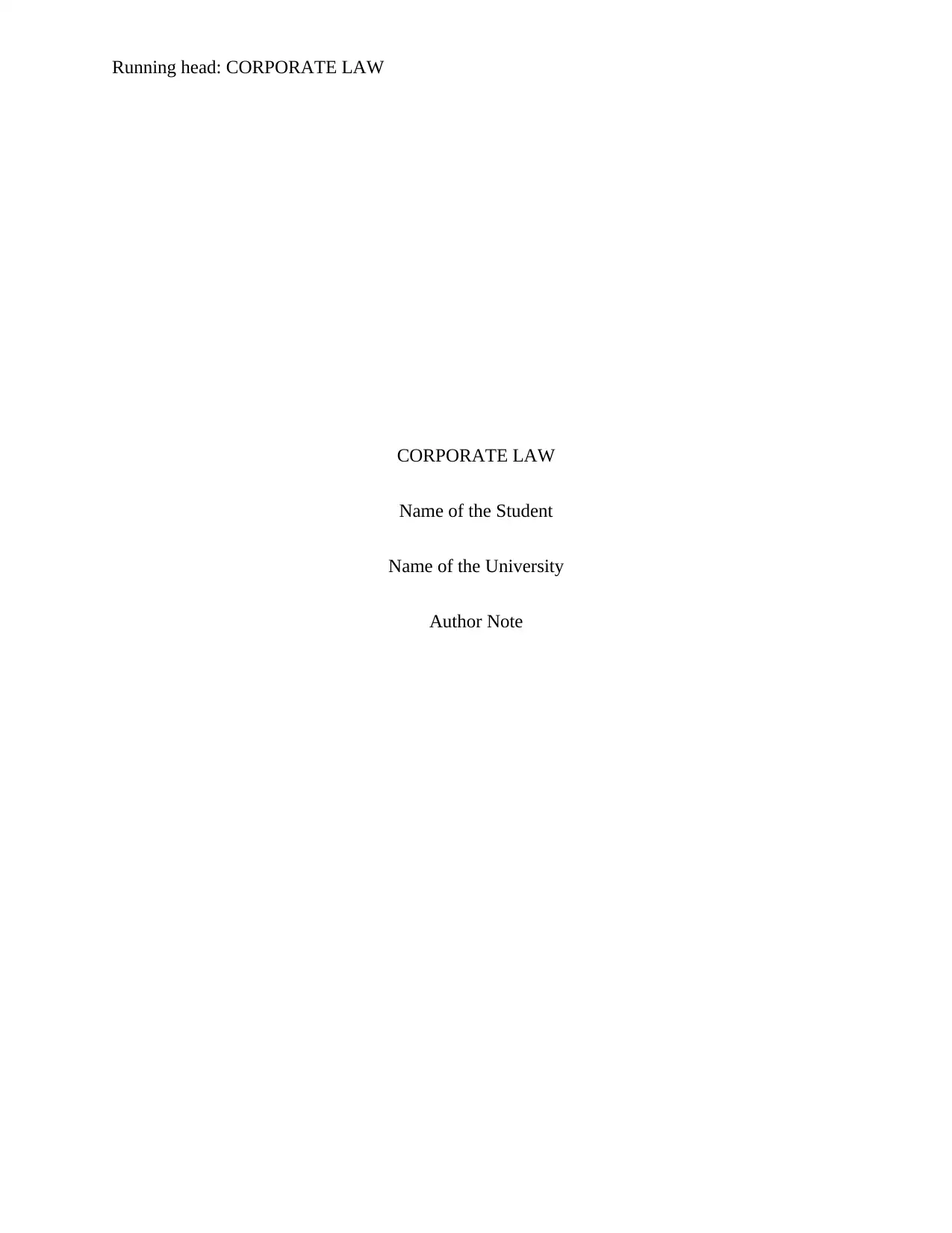
Running head: CORPORATE LAW
CORPORATE LAW
Name of the Student
Name of the University
Author Note
CORPORATE LAW
Name of the Student
Name of the University
Author Note
Paraphrase This Document
Need a fresh take? Get an instant paraphrase of this document with our AI Paraphraser
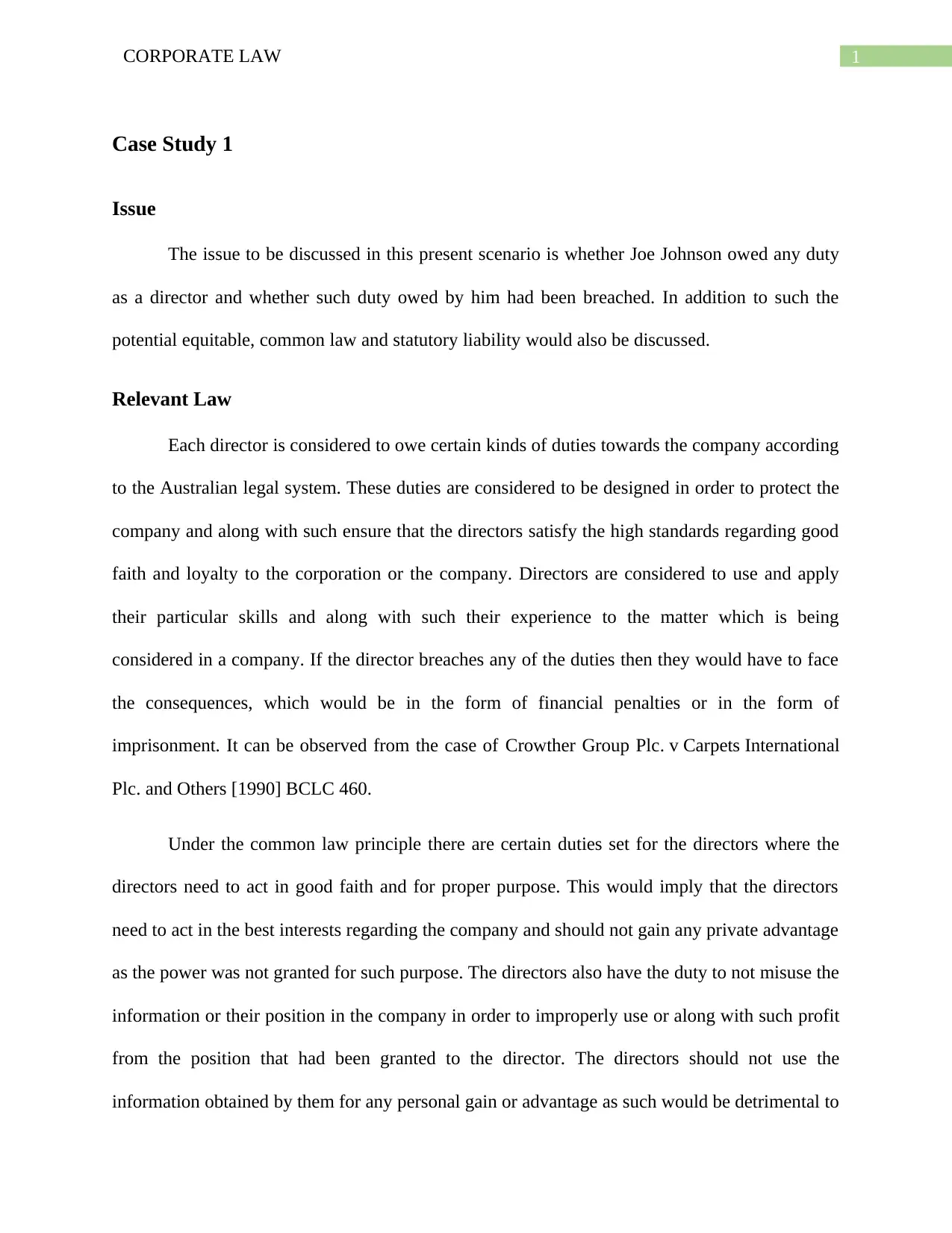
1CORPORATE LAW
Case Study 1
Issue
The issue to be discussed in this present scenario is whether Joe Johnson owed any duty
as a director and whether such duty owed by him had been breached. In addition to such the
potential equitable, common law and statutory liability would also be discussed.
Relevant Law
Each director is considered to owe certain kinds of duties towards the company according
to the Australian legal system. These duties are considered to be designed in order to protect the
company and along with such ensure that the directors satisfy the high standards regarding good
faith and loyalty to the corporation or the company. Directors are considered to use and apply
their particular skills and along with such their experience to the matter which is being
considered in a company. If the director breaches any of the duties then they would have to face
the consequences, which would be in the form of financial penalties or in the form of
imprisonment. It can be observed from the case of Crowther Group Plc. v Carpets International
Plc. and Others [1990] BCLC 460.
Under the common law principle there are certain duties set for the directors where the
directors need to act in good faith and for proper purpose. This would imply that the directors
need to act in the best interests regarding the company and should not gain any private advantage
as the power was not granted for such purpose. The directors also have the duty to not misuse the
information or their position in the company in order to improperly use or along with such profit
from the position that had been granted to the director. The directors should not use the
information obtained by them for any personal gain or advantage as such would be detrimental to
Case Study 1
Issue
The issue to be discussed in this present scenario is whether Joe Johnson owed any duty
as a director and whether such duty owed by him had been breached. In addition to such the
potential equitable, common law and statutory liability would also be discussed.
Relevant Law
Each director is considered to owe certain kinds of duties towards the company according
to the Australian legal system. These duties are considered to be designed in order to protect the
company and along with such ensure that the directors satisfy the high standards regarding good
faith and loyalty to the corporation or the company. Directors are considered to use and apply
their particular skills and along with such their experience to the matter which is being
considered in a company. If the director breaches any of the duties then they would have to face
the consequences, which would be in the form of financial penalties or in the form of
imprisonment. It can be observed from the case of Crowther Group Plc. v Carpets International
Plc. and Others [1990] BCLC 460.
Under the common law principle there are certain duties set for the directors where the
directors need to act in good faith and for proper purpose. This would imply that the directors
need to act in the best interests regarding the company and should not gain any private advantage
as the power was not granted for such purpose. The directors also have the duty to not misuse the
information or their position in the company in order to improperly use or along with such profit
from the position that had been granted to the director. The directors should not use the
information obtained by them for any personal gain or advantage as such would be detrimental to
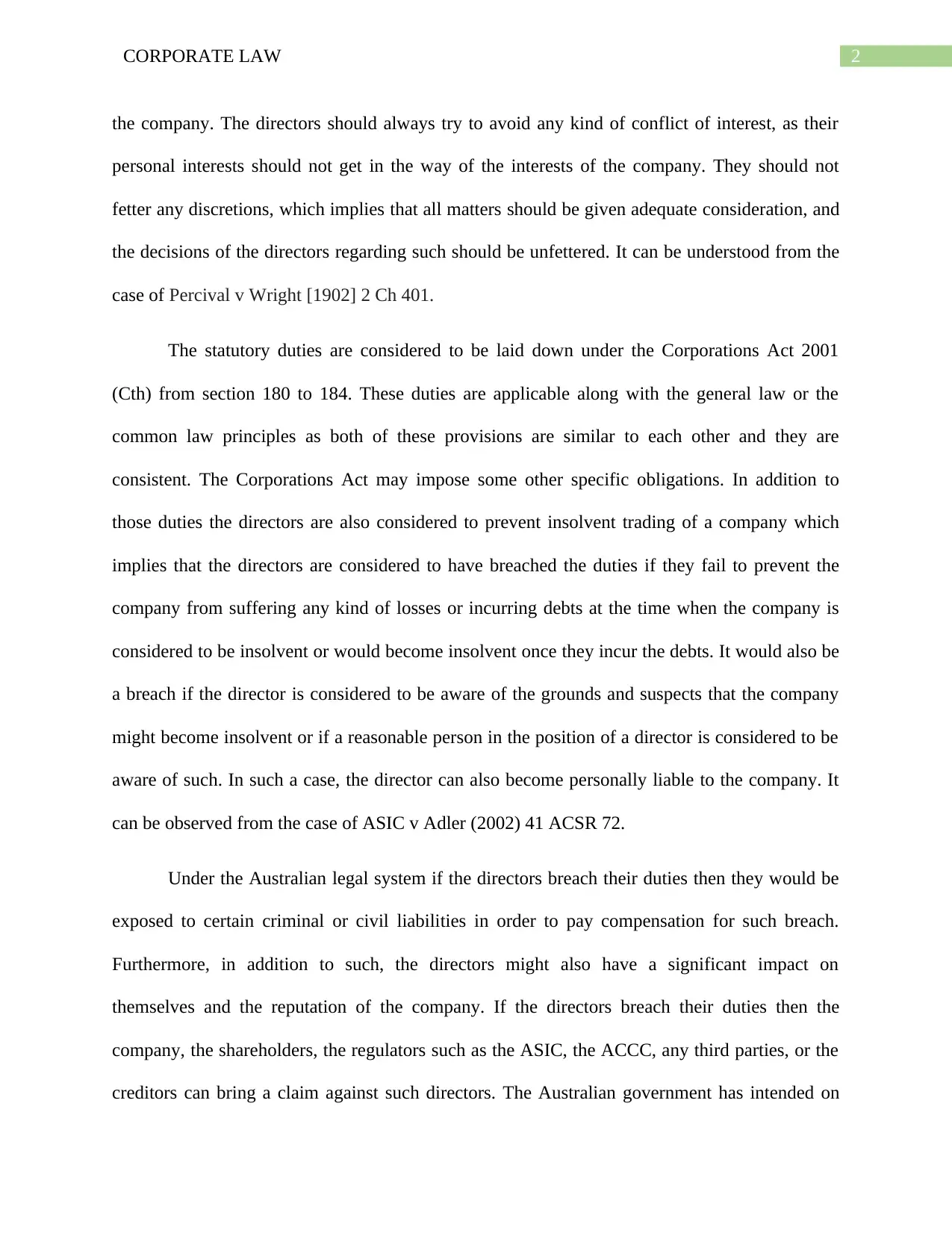
2CORPORATE LAW
the company. The directors should always try to avoid any kind of conflict of interest, as their
personal interests should not get in the way of the interests of the company. They should not
fetter any discretions, which implies that all matters should be given adequate consideration, and
the decisions of the directors regarding such should be unfettered. It can be understood from the
case of Percival v Wright [1902] 2 Ch 401.
The statutory duties are considered to be laid down under the Corporations Act 2001
(Cth) from section 180 to 184. These duties are applicable along with the general law or the
common law principles as both of these provisions are similar to each other and they are
consistent. The Corporations Act may impose some other specific obligations. In addition to
those duties the directors are also considered to prevent insolvent trading of a company which
implies that the directors are considered to have breached the duties if they fail to prevent the
company from suffering any kind of losses or incurring debts at the time when the company is
considered to be insolvent or would become insolvent once they incur the debts. It would also be
a breach if the director is considered to be aware of the grounds and suspects that the company
might become insolvent or if a reasonable person in the position of a director is considered to be
aware of such. In such a case, the director can also become personally liable to the company. It
can be observed from the case of ASIC v Adler (2002) 41 ACSR 72.
Under the Australian legal system if the directors breach their duties then they would be
exposed to certain criminal or civil liabilities in order to pay compensation for such breach.
Furthermore, in addition to such, the directors might also have a significant impact on
themselves and the reputation of the company. If the directors breach their duties then the
company, the shareholders, the regulators such as the ASIC, the ACCC, any third parties, or the
creditors can bring a claim against such directors. The Australian government has intended on
the company. The directors should always try to avoid any kind of conflict of interest, as their
personal interests should not get in the way of the interests of the company. They should not
fetter any discretions, which implies that all matters should be given adequate consideration, and
the decisions of the directors regarding such should be unfettered. It can be understood from the
case of Percival v Wright [1902] 2 Ch 401.
The statutory duties are considered to be laid down under the Corporations Act 2001
(Cth) from section 180 to 184. These duties are applicable along with the general law or the
common law principles as both of these provisions are similar to each other and they are
consistent. The Corporations Act may impose some other specific obligations. In addition to
those duties the directors are also considered to prevent insolvent trading of a company which
implies that the directors are considered to have breached the duties if they fail to prevent the
company from suffering any kind of losses or incurring debts at the time when the company is
considered to be insolvent or would become insolvent once they incur the debts. It would also be
a breach if the director is considered to be aware of the grounds and suspects that the company
might become insolvent or if a reasonable person in the position of a director is considered to be
aware of such. In such a case, the director can also become personally liable to the company. It
can be observed from the case of ASIC v Adler (2002) 41 ACSR 72.
Under the Australian legal system if the directors breach their duties then they would be
exposed to certain criminal or civil liabilities in order to pay compensation for such breach.
Furthermore, in addition to such, the directors might also have a significant impact on
themselves and the reputation of the company. If the directors breach their duties then the
company, the shareholders, the regulators such as the ASIC, the ACCC, any third parties, or the
creditors can bring a claim against such directors. The Australian government has intended on
⊘ This is a preview!⊘
Do you want full access?
Subscribe today to unlock all pages.

Trusted by 1+ million students worldwide
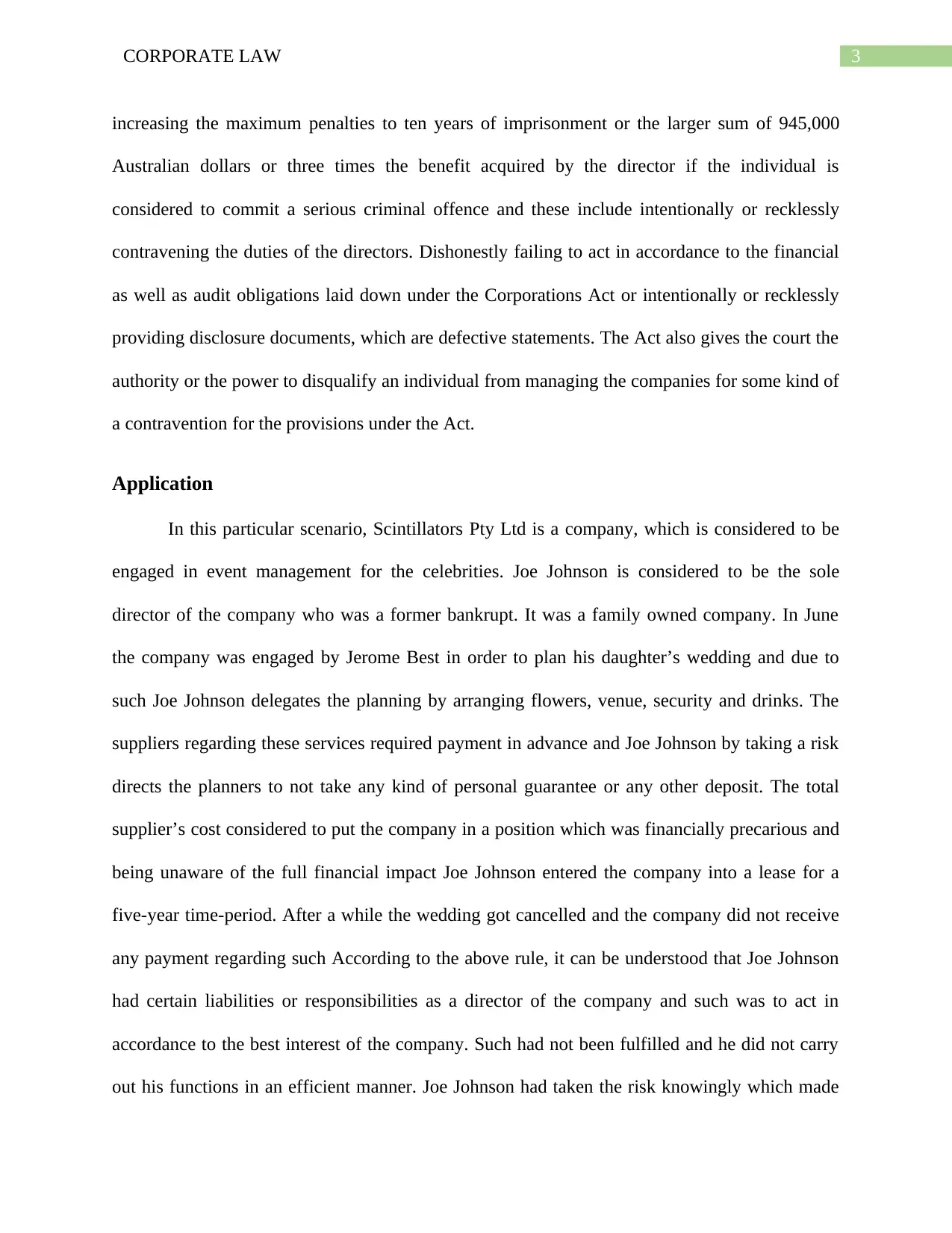
3CORPORATE LAW
increasing the maximum penalties to ten years of imprisonment or the larger sum of 945,000
Australian dollars or three times the benefit acquired by the director if the individual is
considered to commit a serious criminal offence and these include intentionally or recklessly
contravening the duties of the directors. Dishonestly failing to act in accordance to the financial
as well as audit obligations laid down under the Corporations Act or intentionally or recklessly
providing disclosure documents, which are defective statements. The Act also gives the court the
authority or the power to disqualify an individual from managing the companies for some kind of
a contravention for the provisions under the Act.
Application
In this particular scenario, Scintillators Pty Ltd is a company, which is considered to be
engaged in event management for the celebrities. Joe Johnson is considered to be the sole
director of the company who was a former bankrupt. It was a family owned company. In June
the company was engaged by Jerome Best in order to plan his daughter’s wedding and due to
such Joe Johnson delegates the planning by arranging flowers, venue, security and drinks. The
suppliers regarding these services required payment in advance and Joe Johnson by taking a risk
directs the planners to not take any kind of personal guarantee or any other deposit. The total
supplier’s cost considered to put the company in a position which was financially precarious and
being unaware of the full financial impact Joe Johnson entered the company into a lease for a
five-year time-period. After a while the wedding got cancelled and the company did not receive
any payment regarding such According to the above rule, it can be understood that Joe Johnson
had certain liabilities or responsibilities as a director of the company and such was to act in
accordance to the best interest of the company. Such had not been fulfilled and he did not carry
out his functions in an efficient manner. Joe Johnson had taken the risk knowingly which made
increasing the maximum penalties to ten years of imprisonment or the larger sum of 945,000
Australian dollars or three times the benefit acquired by the director if the individual is
considered to commit a serious criminal offence and these include intentionally or recklessly
contravening the duties of the directors. Dishonestly failing to act in accordance to the financial
as well as audit obligations laid down under the Corporations Act or intentionally or recklessly
providing disclosure documents, which are defective statements. The Act also gives the court the
authority or the power to disqualify an individual from managing the companies for some kind of
a contravention for the provisions under the Act.
Application
In this particular scenario, Scintillators Pty Ltd is a company, which is considered to be
engaged in event management for the celebrities. Joe Johnson is considered to be the sole
director of the company who was a former bankrupt. It was a family owned company. In June
the company was engaged by Jerome Best in order to plan his daughter’s wedding and due to
such Joe Johnson delegates the planning by arranging flowers, venue, security and drinks. The
suppliers regarding these services required payment in advance and Joe Johnson by taking a risk
directs the planners to not take any kind of personal guarantee or any other deposit. The total
supplier’s cost considered to put the company in a position which was financially precarious and
being unaware of the full financial impact Joe Johnson entered the company into a lease for a
five-year time-period. After a while the wedding got cancelled and the company did not receive
any payment regarding such According to the above rule, it can be understood that Joe Johnson
had certain liabilities or responsibilities as a director of the company and such was to act in
accordance to the best interest of the company. Such had not been fulfilled and he did not carry
out his functions in an efficient manner. Joe Johnson had taken the risk knowingly which made
Paraphrase This Document
Need a fresh take? Get an instant paraphrase of this document with our AI Paraphraser
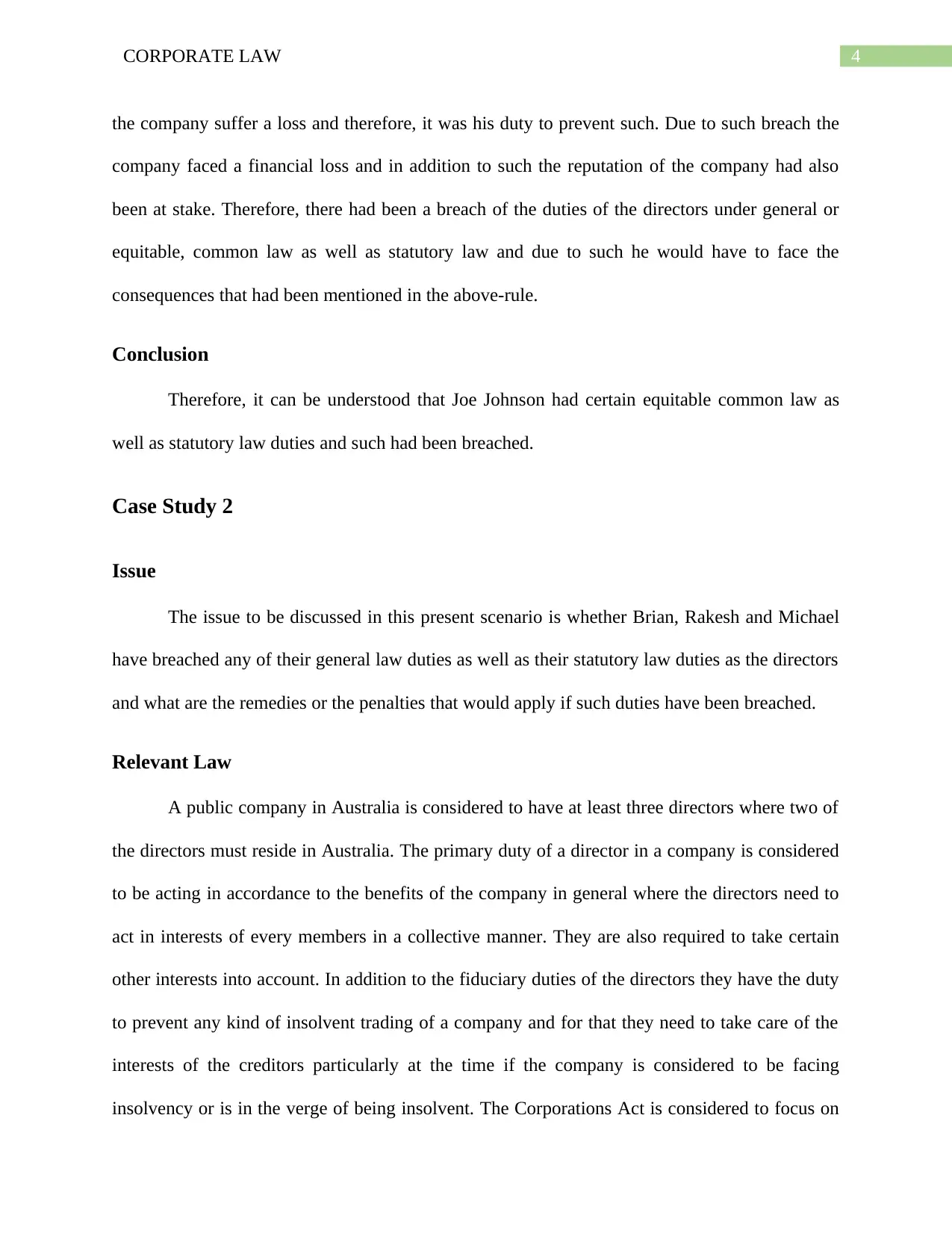
4CORPORATE LAW
the company suffer a loss and therefore, it was his duty to prevent such. Due to such breach the
company faced a financial loss and in addition to such the reputation of the company had also
been at stake. Therefore, there had been a breach of the duties of the directors under general or
equitable, common law as well as statutory law and due to such he would have to face the
consequences that had been mentioned in the above-rule.
Conclusion
Therefore, it can be understood that Joe Johnson had certain equitable common law as
well as statutory law duties and such had been breached.
Case Study 2
Issue
The issue to be discussed in this present scenario is whether Brian, Rakesh and Michael
have breached any of their general law duties as well as their statutory law duties as the directors
and what are the remedies or the penalties that would apply if such duties have been breached.
Relevant Law
A public company in Australia is considered to have at least three directors where two of
the directors must reside in Australia. The primary duty of a director in a company is considered
to be acting in accordance to the benefits of the company in general where the directors need to
act in interests of every members in a collective manner. They are also required to take certain
other interests into account. In addition to the fiduciary duties of the directors they have the duty
to prevent any kind of insolvent trading of a company and for that they need to take care of the
interests of the creditors particularly at the time if the company is considered to be facing
insolvency or is in the verge of being insolvent. The Corporations Act is considered to focus on
the company suffer a loss and therefore, it was his duty to prevent such. Due to such breach the
company faced a financial loss and in addition to such the reputation of the company had also
been at stake. Therefore, there had been a breach of the duties of the directors under general or
equitable, common law as well as statutory law and due to such he would have to face the
consequences that had been mentioned in the above-rule.
Conclusion
Therefore, it can be understood that Joe Johnson had certain equitable common law as
well as statutory law duties and such had been breached.
Case Study 2
Issue
The issue to be discussed in this present scenario is whether Brian, Rakesh and Michael
have breached any of their general law duties as well as their statutory law duties as the directors
and what are the remedies or the penalties that would apply if such duties have been breached.
Relevant Law
A public company in Australia is considered to have at least three directors where two of
the directors must reside in Australia. The primary duty of a director in a company is considered
to be acting in accordance to the benefits of the company in general where the directors need to
act in interests of every members in a collective manner. They are also required to take certain
other interests into account. In addition to the fiduciary duties of the directors they have the duty
to prevent any kind of insolvent trading of a company and for that they need to take care of the
interests of the creditors particularly at the time if the company is considered to be facing
insolvency or is in the verge of being insolvent. The Corporations Act is considered to focus on
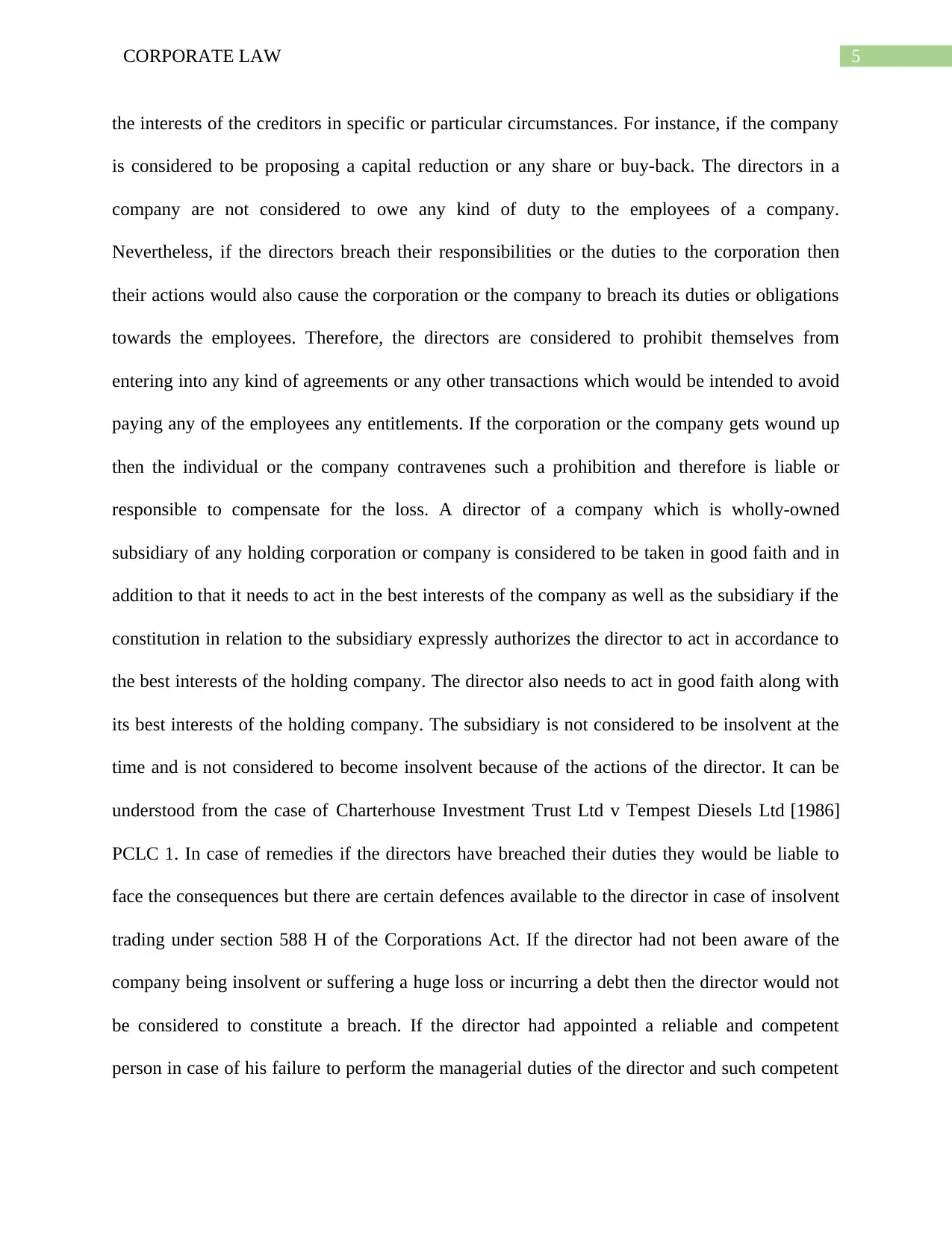
5CORPORATE LAW
the interests of the creditors in specific or particular circumstances. For instance, if the company
is considered to be proposing a capital reduction or any share or buy-back. The directors in a
company are not considered to owe any kind of duty to the employees of a company.
Nevertheless, if the directors breach their responsibilities or the duties to the corporation then
their actions would also cause the corporation or the company to breach its duties or obligations
towards the employees. Therefore, the directors are considered to prohibit themselves from
entering into any kind of agreements or any other transactions which would be intended to avoid
paying any of the employees any entitlements. If the corporation or the company gets wound up
then the individual or the company contravenes such a prohibition and therefore is liable or
responsible to compensate for the loss. A director of a company which is wholly-owned
subsidiary of any holding corporation or company is considered to be taken in good faith and in
addition to that it needs to act in the best interests of the company as well as the subsidiary if the
constitution in relation to the subsidiary expressly authorizes the director to act in accordance to
the best interests of the holding company. The director also needs to act in good faith along with
its best interests of the holding company. The subsidiary is not considered to be insolvent at the
time and is not considered to become insolvent because of the actions of the director. It can be
understood from the case of Charterhouse Investment Trust Ltd v Tempest Diesels Ltd [1986]
PCLC 1. In case of remedies if the directors have breached their duties they would be liable to
face the consequences but there are certain defences available to the director in case of insolvent
trading under section 588 H of the Corporations Act. If the director had not been aware of the
company being insolvent or suffering a huge loss or incurring a debt then the director would not
be considered to constitute a breach. If the director had appointed a reliable and competent
person in case of his failure to perform the managerial duties of the director and such competent
the interests of the creditors in specific or particular circumstances. For instance, if the company
is considered to be proposing a capital reduction or any share or buy-back. The directors in a
company are not considered to owe any kind of duty to the employees of a company.
Nevertheless, if the directors breach their responsibilities or the duties to the corporation then
their actions would also cause the corporation or the company to breach its duties or obligations
towards the employees. Therefore, the directors are considered to prohibit themselves from
entering into any kind of agreements or any other transactions which would be intended to avoid
paying any of the employees any entitlements. If the corporation or the company gets wound up
then the individual or the company contravenes such a prohibition and therefore is liable or
responsible to compensate for the loss. A director of a company which is wholly-owned
subsidiary of any holding corporation or company is considered to be taken in good faith and in
addition to that it needs to act in the best interests of the company as well as the subsidiary if the
constitution in relation to the subsidiary expressly authorizes the director to act in accordance to
the best interests of the holding company. The director also needs to act in good faith along with
its best interests of the holding company. The subsidiary is not considered to be insolvent at the
time and is not considered to become insolvent because of the actions of the director. It can be
understood from the case of Charterhouse Investment Trust Ltd v Tempest Diesels Ltd [1986]
PCLC 1. In case of remedies if the directors have breached their duties they would be liable to
face the consequences but there are certain defences available to the director in case of insolvent
trading under section 588 H of the Corporations Act. If the director had not been aware of the
company being insolvent or suffering a huge loss or incurring a debt then the director would not
be considered to constitute a breach. If the director had appointed a reliable and competent
person in case of his failure to perform the managerial duties of the director and such competent
⊘ This is a preview!⊘
Do you want full access?
Subscribe today to unlock all pages.

Trusted by 1+ million students worldwide
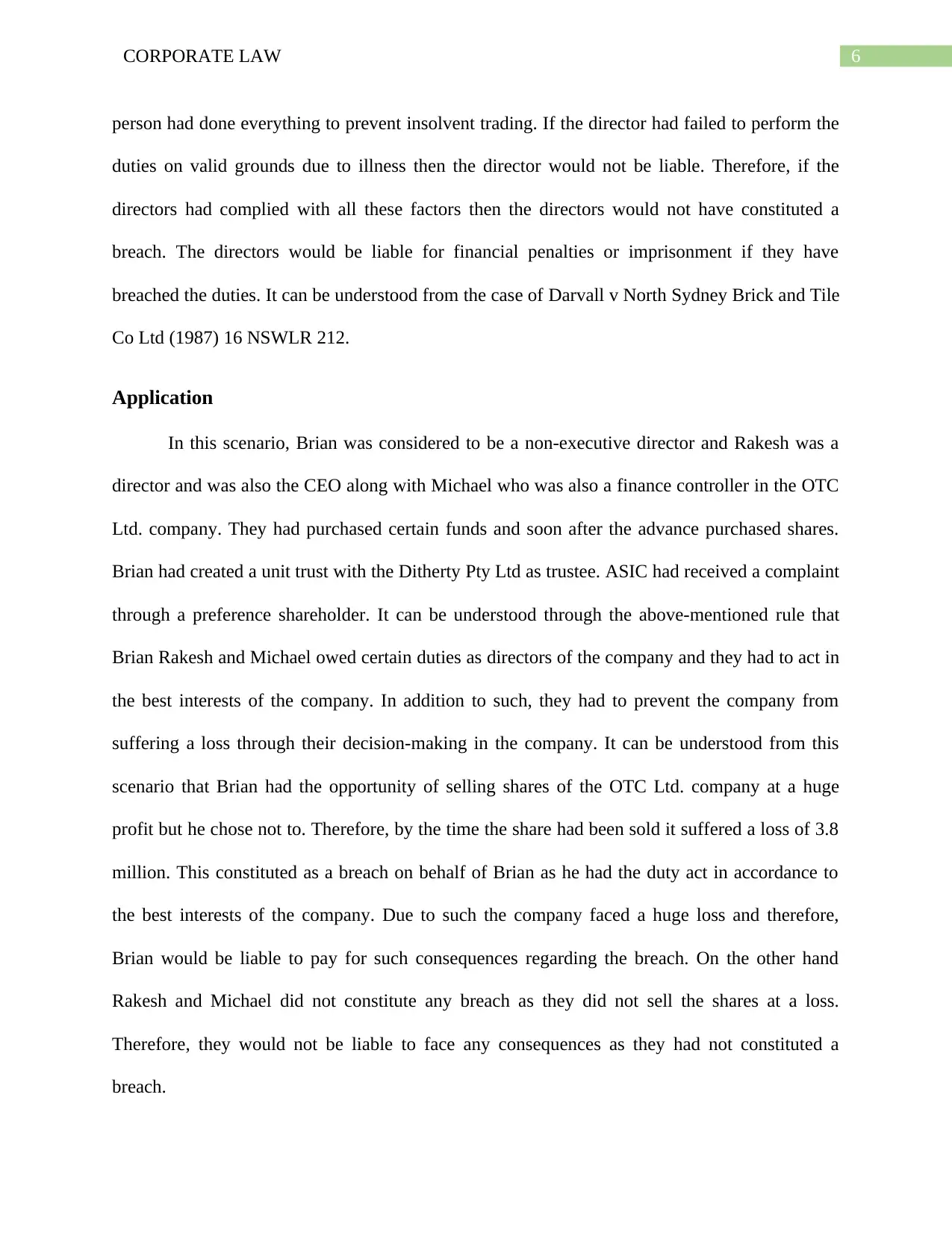
6CORPORATE LAW
person had done everything to prevent insolvent trading. If the director had failed to perform the
duties on valid grounds due to illness then the director would not be liable. Therefore, if the
directors had complied with all these factors then the directors would not have constituted a
breach. The directors would be liable for financial penalties or imprisonment if they have
breached the duties. It can be understood from the case of Darvall v North Sydney Brick and Tile
Co Ltd (1987) 16 NSWLR 212.
Application
In this scenario, Brian was considered to be a non-executive director and Rakesh was a
director and was also the CEO along with Michael who was also a finance controller in the OTC
Ltd. company. They had purchased certain funds and soon after the advance purchased shares.
Brian had created a unit trust with the Ditherty Pty Ltd as trustee. ASIC had received a complaint
through a preference shareholder. It can be understood through the above-mentioned rule that
Brian Rakesh and Michael owed certain duties as directors of the company and they had to act in
the best interests of the company. In addition to such, they had to prevent the company from
suffering a loss through their decision-making in the company. It can be understood from this
scenario that Brian had the opportunity of selling shares of the OTC Ltd. company at a huge
profit but he chose not to. Therefore, by the time the share had been sold it suffered a loss of 3.8
million. This constituted as a breach on behalf of Brian as he had the duty act in accordance to
the best interests of the company. Due to such the company faced a huge loss and therefore,
Brian would be liable to pay for such consequences regarding the breach. On the other hand
Rakesh and Michael did not constitute any breach as they did not sell the shares at a loss.
Therefore, they would not be liable to face any consequences as they had not constituted a
breach.
person had done everything to prevent insolvent trading. If the director had failed to perform the
duties on valid grounds due to illness then the director would not be liable. Therefore, if the
directors had complied with all these factors then the directors would not have constituted a
breach. The directors would be liable for financial penalties or imprisonment if they have
breached the duties. It can be understood from the case of Darvall v North Sydney Brick and Tile
Co Ltd (1987) 16 NSWLR 212.
Application
In this scenario, Brian was considered to be a non-executive director and Rakesh was a
director and was also the CEO along with Michael who was also a finance controller in the OTC
Ltd. company. They had purchased certain funds and soon after the advance purchased shares.
Brian had created a unit trust with the Ditherty Pty Ltd as trustee. ASIC had received a complaint
through a preference shareholder. It can be understood through the above-mentioned rule that
Brian Rakesh and Michael owed certain duties as directors of the company and they had to act in
the best interests of the company. In addition to such, they had to prevent the company from
suffering a loss through their decision-making in the company. It can be understood from this
scenario that Brian had the opportunity of selling shares of the OTC Ltd. company at a huge
profit but he chose not to. Therefore, by the time the share had been sold it suffered a loss of 3.8
million. This constituted as a breach on behalf of Brian as he had the duty act in accordance to
the best interests of the company. Due to such the company faced a huge loss and therefore,
Brian would be liable to pay for such consequences regarding the breach. On the other hand
Rakesh and Michael did not constitute any breach as they did not sell the shares at a loss.
Therefore, they would not be liable to face any consequences as they had not constituted a
breach.
Paraphrase This Document
Need a fresh take? Get an instant paraphrase of this document with our AI Paraphraser
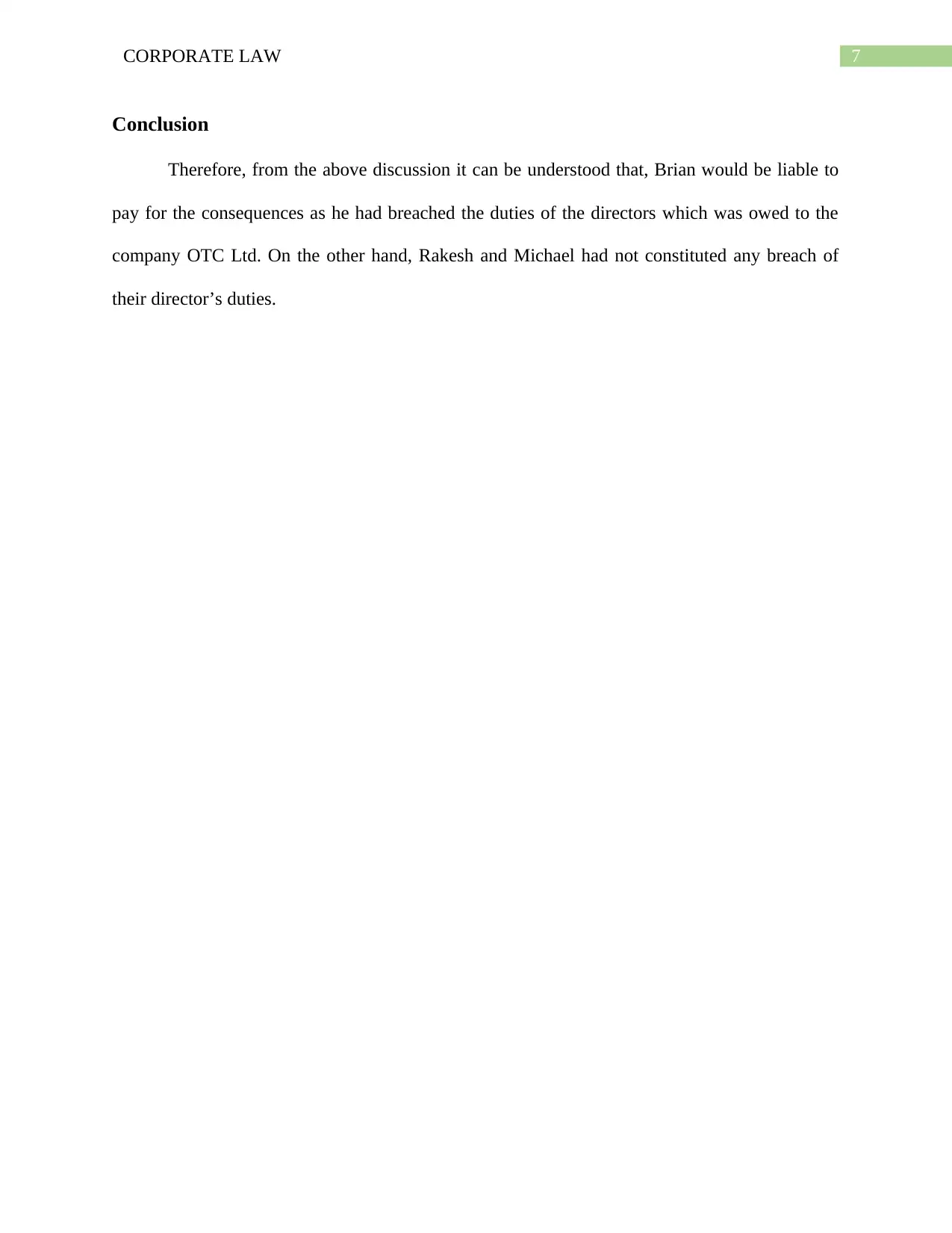
7CORPORATE LAW
Conclusion
Therefore, from the above discussion it can be understood that, Brian would be liable to
pay for the consequences as he had breached the duties of the directors which was owed to the
company OTC Ltd. On the other hand, Rakesh and Michael had not constituted any breach of
their director’s duties.
Conclusion
Therefore, from the above discussion it can be understood that, Brian would be liable to
pay for the consequences as he had breached the duties of the directors which was owed to the
company OTC Ltd. On the other hand, Rakesh and Michael had not constituted any breach of
their director’s duties.
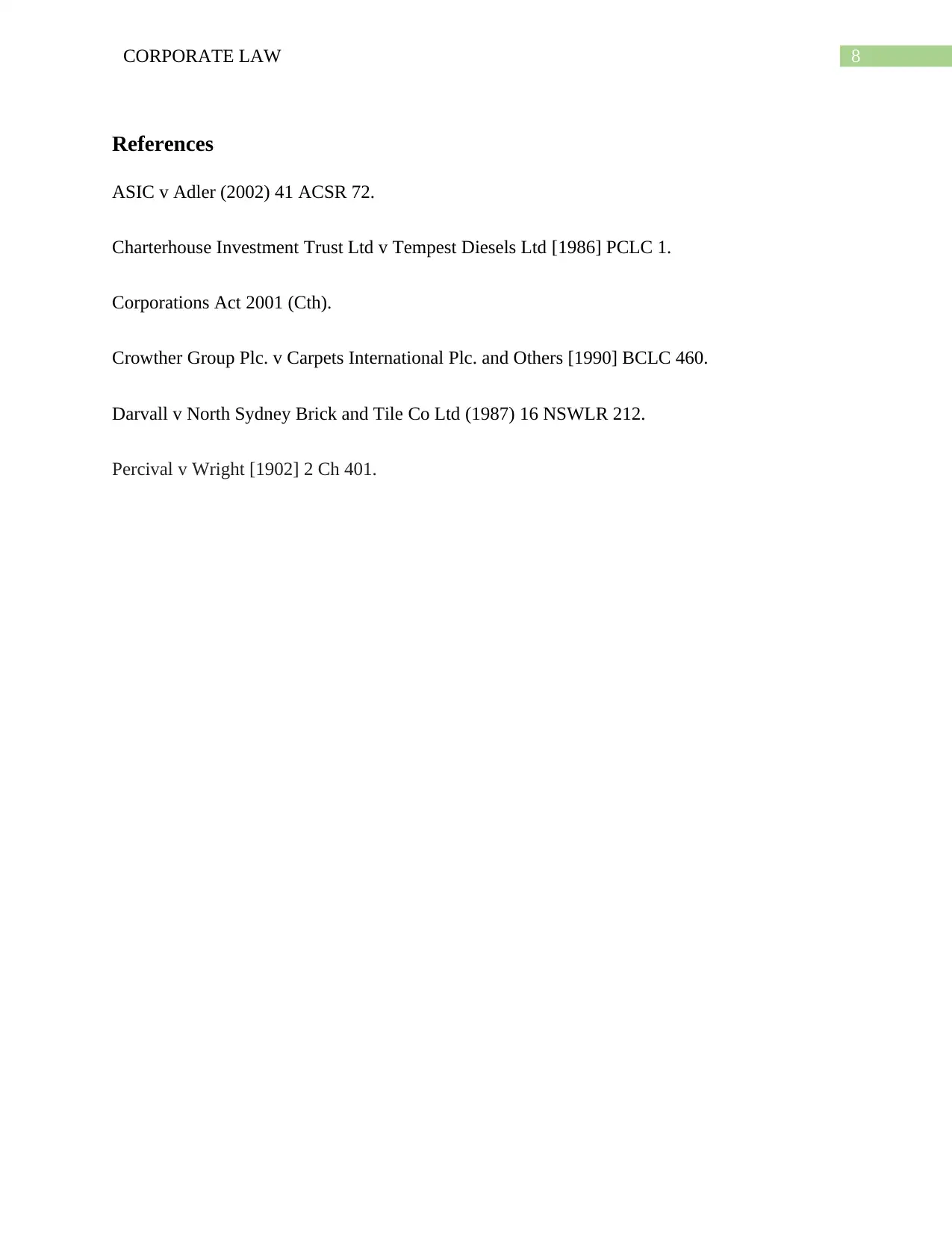
8CORPORATE LAW
References
ASIC v Adler (2002) 41 ACSR 72.
Charterhouse Investment Trust Ltd v Tempest Diesels Ltd [1986] PCLC 1.
Corporations Act 2001 (Cth).
Crowther Group Plc. v Carpets International Plc. and Others [1990] BCLC 460.
Darvall v North Sydney Brick and Tile Co Ltd (1987) 16 NSWLR 212.
Percival v Wright [1902] 2 Ch 401.
References
ASIC v Adler (2002) 41 ACSR 72.
Charterhouse Investment Trust Ltd v Tempest Diesels Ltd [1986] PCLC 1.
Corporations Act 2001 (Cth).
Crowther Group Plc. v Carpets International Plc. and Others [1990] BCLC 460.
Darvall v North Sydney Brick and Tile Co Ltd (1987) 16 NSWLR 212.
Percival v Wright [1902] 2 Ch 401.
⊘ This is a preview!⊘
Do you want full access?
Subscribe today to unlock all pages.

Trusted by 1+ million students worldwide
1 out of 9
Related Documents
Your All-in-One AI-Powered Toolkit for Academic Success.
+13062052269
info@desklib.com
Available 24*7 on WhatsApp / Email
![[object Object]](/_next/static/media/star-bottom.7253800d.svg)
Unlock your academic potential
Copyright © 2020–2025 A2Z Services. All Rights Reserved. Developed and managed by ZUCOL.





